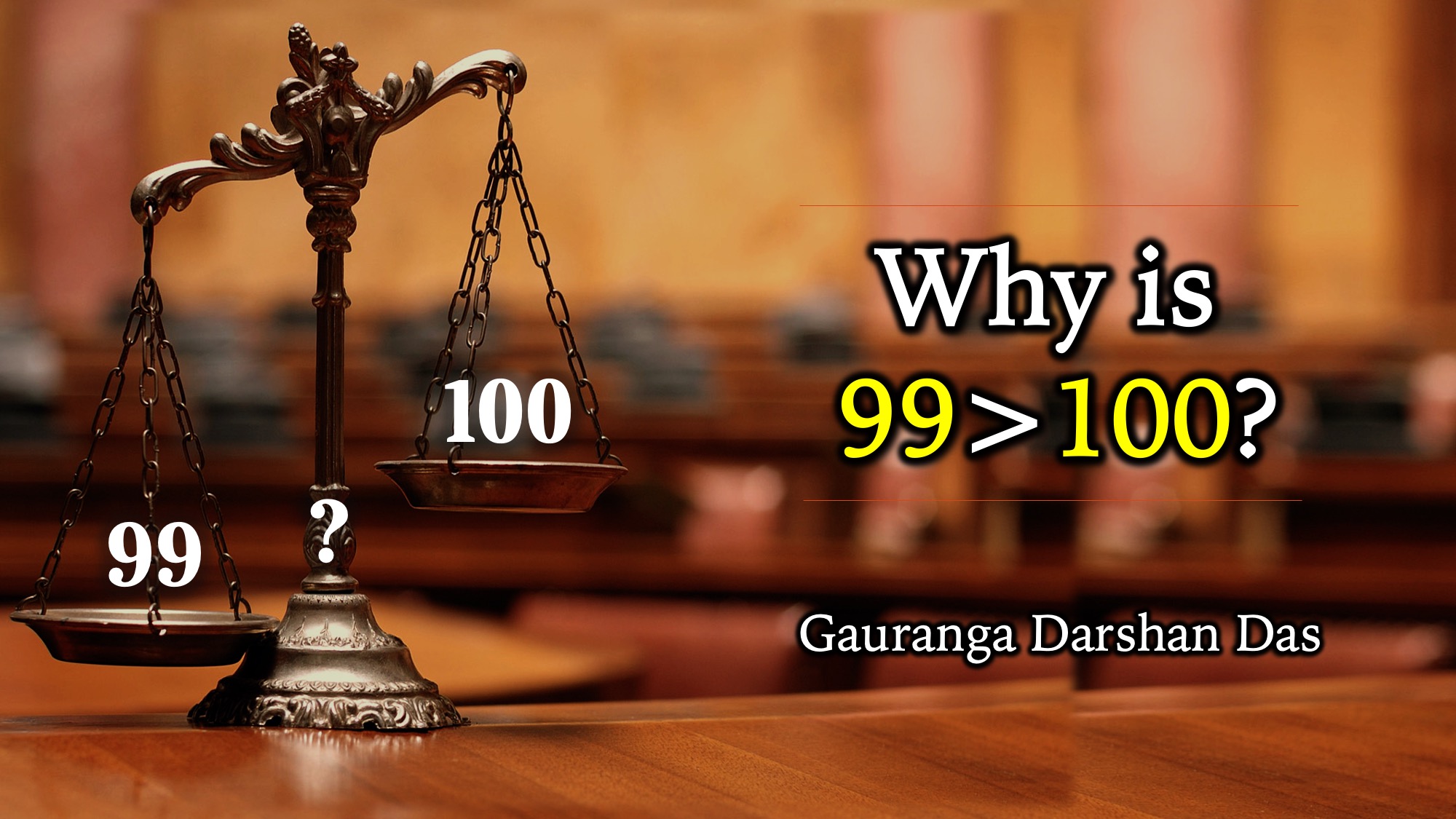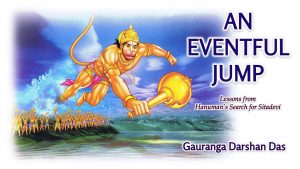Which Is Greater: 99 or 100?
By Gauranga Darshana Das
Sometimes, determining which of two actions is better is not as simple as it may first appear.
Which is greater, 99 or 100? Of course 100 is greater. Then why ask the question? Because the question may be about more than just the numbers.
Imagine that one student honestly scores 99% on an exam while another student copies from someone and scores100%. Whose score is greater? If one person has honestly earned 99 dollars and another has stolen 100 dollars, whose money is greater? In these examples, if we compare the process and consciousness in achieving the numbers, 99 is greater than 100.
Who Is the Greater King: Indra or Pṛthu?
Once upon a time, two kings scored 99 and 100 in some “subject.” The king who scored 99 is considered the greater of the two in many ways and is more honored. Why and how? Here is the story.
Long ago, King Pṛthu was an exemplary ruler of the earth who took care of his citizens just like a loving father. In the Vedic culture, great kings performed fire sacrifices (yajñas) for the citizens’ welfare and to please God. Sacrifice is an act of making offerings to the Supreme Lord Viṣṇu and the demigods, whose pleasure brings peace and prosperity to the people and the rewards of piety to the performer. Once King Pṛthu intended to perform one hundred sacrifices. He completed ninety-nine and began the hundredth. But King Indra, the ruler of the heavenly planets, wantedto impede the sacrifice and therefore stole the sacrificial horse, an essential part of the sacrifice. Indra had performed a hundred sacrifices to attain his post, and he became insecure on seeing Pṛthu performing his one hundredth sacrifice.
Pṛthu’s son Vijitāśava retrieved the horse from Indra, but he didn’t kill Indra, because Indra had dressed himself as a sadhu. Indra stole the horse again, and Vijitāśva brought it back again. As Indra repeatedly tried to seize the horse, Pṛthu became angry and prepared to kill Indra. But Pṛthu’s priests stopped Vijitāśva, saying that they would chant mantrasto cast Indra into fire.
Lord Brahmā, who creates the universe with the ingredients supplied by Lord Viṣṇu, then appearedon the scene and said that Indra shouldn’t be killed. He told Pṛthu to stop the sacrifice so that Indra would give up his nefarious activities. Being obedient to Lord Brahmā, King Pṛthu stopped his one hundredth sacrifice.
Then the Supreme Lord Viṣṇu, who is worshipable by all living entities, appeared there, bringing Indra with Him, and asked Pṛthu to forgive Indra. Indra felt guilty for his misdeed, and Pṛthu excused him wholeheartedly. Later Pṛthu offered fervent prayers to Lord Viṣṇu, who became pleased and offered him wonderful benedictions.
Who is greater in this episode? Indra, the king of heaven, who maintained his record of one hundred sacrifices, or Pṛthu, the king of the earth, who stopped at ninety-nine? The following are few perspectives in this regard.
1. Responsibility vs. Attachment
To seize Pṛthu’s sacrificial horse, King Indra adopted several disguises as a false sadhu that were nothing but symbols of sinful activities. Sinful men sometimes adopt these appearances. When ignorant people accept these imposters as religious, they spoil their life by following them. By disrupting Pṛthu’s sacrifice, Indra could maintain his record of being a śata-kratu (“performer of a hundred sacrifices”) – an epithet he was much attached to. But his attachment made him irresponsible towards the people.
King Pṛthu, on the other hand, was detached enough to stop his one hundredth sacrifice because that meant stopping Indra from introducing false systems of religion that would misguide human society. Pṛthu’s sacrifice was ultimately intended for the welfare of the people, and if his stopping the sacrifice would improve the people’s welfare, then why wouldn’t he do so? He took it as his responsibility.
What is good and what is bad can be dynamic, depending on the time, place, and situation. Intent and outcome are important considerations. A delicious, nutritious, and well-prepared food item may be very tasty and nourishing, but if the person eating it has a particular disease, that same food could be poison. One needs to be mature enough to understand the dynamics of good and bad and be detached and flexible enough to change one’s course of action for better results.
It’s natural to be attached to our accomplishments, desires, and plans. But attachment shouldn’t make us irresponsible. And detachment doesn’t mean giving up responsibility. Responsibility shouldn’t lead to undue attachment, and detachment doesn’t mean irresponsibility. The Bhāgavatam’snarrations of great rājarṣis(sagelike kings) teach us how to live with responsibility and detachment. In this episode, Indra exhibited attachment to his position and irresponsibility towards the people. Pṛthu exhibited detachment from his accomplishment of the sacrifice, and responsibility towards the people.
2. Submissiveness vs. Stubbornness
Although Indra repeatedly failed in his attempts to steal the horse, he stubbornly kept trying. He knew that what he was doing was wrong, and he was even failing in his attempts. But he was stubborn. Determination to perform a destructive task is born of envy. A person bent on committing a wrong deed is stubborn and obsessed, paying no heed to the negative consequences.
Stubborn people cannot be convinced by logic or reason or good advice. If asked to compromise, they might become more stubborn. On the other hand, submissive people follow good advice, such as from experienced superiors, even when it’s difficult to follow.
Submissiveness towards superiors doesn’t mean blind following. If they are unreasonable and immoral in their orders and behavior, one need not be submissive to them. But when they are mature, well-wishing, and loving, a subordinate spontaneously submits to their instruction out of deep respect and trust.
To end the competition between Indra and Pṛthu, Lord Brahmā thought that instead of stopping the stubborn Indra from introducing more irreligious systems, it would be better to stop Pṛthu from doing the sacrifice. King Pṛthu did not argue with Brahmā and say that there was no mistake on his part, which was a fact. The mistake was Indra’s. Still Pṛthu didn’t ask Brahmā why he was being stopped instead of Indra. Pṛthu submissively followed Brahmā’s instruction, knowing and acknowledging his greatness and the relevance of his advice.
People who are submissive to worthy superiors are often bestowed the necessary intelligence and information to comprehend things from a broader perspective. Stubborn people who block their ears to good advice are deprived of a better understanding of life.
3. Flexibility vs. Rigidity
Lord Brahmā chose to solve the conflict between Pṛthu and Indra by stopping Pṛthu rather than Indra because he considered Pṛthu more mature. In a dispute between two children, the parents generally ask the older child to compromise because the older child understands things better.
Therefore, Lord Brahmā said, “In order to make trouble and impede the performance of King Pṛthu’s great sacrifice, King Indra has adopted some means that in the future will destroy the clear path of religious life. I draw your attention to this fact. If you oppose him any further, he will further misuse his power and introduce many other irreligious systems. Let there be only ninety-nine sacrificial performances for Mahārāja Pṛthu.” (Bhāgavatam4.19.31–32)
Lord Brahmā had not told Pṛthu to stop his second or tenth or even fiftieth sacrifice. Pṛthu could have become angry at being stopped just has he was about to accomplish his long-sought goal of one hundred sacrifices, but he was flexible enough to understand Brahmā’s higher purpose, that of stopping the irreligious systems being introduced by Indra. Thus, without argument or negotiation, Pṛthu gave up his plan to do the one hundredth sacrifice.
Being rigid and uncompromising in following certain authorized and universal principles is mandatory. But at times people tend to become too rigid in their opinions and desires, even unreasonable ones. Sometimes we need to be flexible according to time, place, circumstances, and the people involved.
Flexible people can adapt according to the situation, giving importance to a higher principle and considering others’ welfare. But selfish and rigid people generally cannot compromise on their stance or ambition even if it causes great damage to others. Flexible people win more trust from their superiors than rigid and inflexible people. That’s the difference between Pṛthu and Indra in this episode.
With a concerned heart, compromising for a higher purpose is not a defeat; it is a victory. But being rigid for one’s selfish purposes is a defeat.
4. Dependence on God vs. Insecurity
Indra felt insecure when Pṛthu was about to complete one hundred sacrifices and thus defeat Indra’s record. He couldn’t accept Pṛthu’s glory but tried to deceitfully subdue his power. When Pṛthu was stopped from doing his final sacrifice, however, Pṛthu took it as the supreme will of the Lord and prudently accepted the situation. Apparently Pṛthu’s score was 99 and Indra’s was 100, but Pṛthu’s faith, his dependence on the Supreme Lord, and his obedience to Brahmā made his score of 99 greater than Indra’s score of 100.
We should do our duties with all good intentions and fight to overcome any obstacles with the best of our capacity. “Man proposes and God disposes.” But we also need to understand that everything is not in our control, and we need to leave room for the unexpected. When things are ordained by higher powers, we need to learn to submit to the situation and welcome the will of God. Such dependence on God’s will makes us peaceful in any situation.
In this regard, Lord Brahmā told King Pṛthu:
māsmin mahārāja kṛthāḥsma cintāṁ
niśāmayāsmad-vaca ādṛtātmā
yad dhyāyato daiva-hataṁ nu kartuṁ
mano tiruṣṭaṁ viśate tamo ’ndham
“My dear King, do not be agitated and anxious because your sacrifices have not been properly executed due to providential impediments. Kindly take my words with great respect. We should always remember that if something happens by providential arrangement, we should not be very sorry. The more we try to rectify such reversals, the more we enter into the darkest region of materialistic thought.” (Bhāgavatam4.19.34)
5. Forgiveness vs. Envy
Pṛthu’s sacrifices were ultimately meant to satisfy the SupremeLord Viṣṇu, whose mercy is the source of all prosperity and power. By his devotion and meticulous performance of sacrifices, King Pṛthu pleased Lord Viṣṇu and received His favor. The nature of this material world, however, is that even if one does a good deed with a pure intention, as a service to the Supreme Lord and humanity, still there are envious people who cannot tolerate it.
Indra became envious of Pṛthu and competed with him. Envy of others is in fact self-envy. One’s envy intended to destroy others ultimately destroys oneself. In an immature mind, envy manifests when one sees others’ success. If not eliminated in the beginning, envy turns into action, damaging oneself and others. Actually, envy is an indirect appreciation of others. So why not glorify others directly? Indra finally came to this consciousness by Lord Brahmā’s mature intervention and Pṛthu’s submissive attitude.
When Indra repented his mistake and fell at Pṛthu’s feet, Pṛthu compassionately forgave him without any grudges. Pṛthu immediately embraced Indra and excused him wholeheartedly. Both of them forgot the past incidents. Although they had been angry at each other, being devotees of Lord Viṣṇu they again became cooperative. Selfless compassion and forgiveness can even transform the hearts of the most envious people.
When two people desire the same thing and only one of them has it, the bereft person often becomes envious. That is due to the natural scarcity in this limited world, and more accurately the scarcity mentalityof the people here. But in the spiritual world there is enough for everyone. There is no scarcity and no reason to be envious. Further, everyone there is satisfied with what they have and who they are. We can bring such an atmosphere into this world by cultivating spiritual satisfaction and genuinely appreciating others for what they have and are.
6. A Broad Vision vs. a Quick Solution
Although Indra made a petty mistake by disrupting Pṛthu’s sacrifice, Indra was not someone to be demeaned. Attaining the position of the master of heaven is not an easy thing. Such a responsible post is given to one who has performed heaps of pious activities and become qualified in many ways. But the illusory nature of the material world is so powerful that it impels even exalted demigods like Indra to be overwhelmed by circumstantial envy, anger, lust, and other lower tendencies. We may learn what not to do from the mistakes of great people, but we shouldn’t offend them.
Lord Brahmā is fully aware of Indra’s exalted position and responsibility. So, although Brahmā disapproved of Indra’s action, he didn’t disown Indra. He didn’t want to punish or dethrone Indra, but he wanted to act in such a way that Indra would come back to his senses. This is an example of Brahmā’s broad vision.
A mature leader tries resolving conflicts without rejecting anyone. Excluding someone may be easy, but accommodating and uplifting someone requires expertise and a good heart.
The purpose of administration and the role of the administrators is the welfare of the people in the organization or affected by the organization. When conflict arises between two leaders, their superior shouldn’t necessarily think in terms of who is right and who is wrong, accepting one and rejecting the other. A superior needs to determine how to positively motivate both leaders, considering what best serves everyone’s welfare.
Brahmā didn’t just want to finish the job of stopping the dispute somehow. He took a direction that brought out the best in both parties. Brahmā’s way of dealing with the situation announced the glorious qualities of King Pṛthu for all generations to come, and brought a positive transformation in Indra’s character too. Brahmā asked Pṛthu, rather than Indra, to stop what he was doing. Finally, Indra became ashamed, realized his mistake, and apologized to Pṛthu. Lord Viṣṇu brought Indra to Pṛthu so that Pṛthu could excuse him. Indra later resumed his role as the ruler of heaven and continued to contribute to the cosmic management.
7. Character vs. Accomplishment
All the aspects of Pṛthu’s character described above are much greater than an accomplishment of a hundred sacrifices. The benefits of Pṛthu’s completion of the one hundredth sacrifice would not have compared to what he received: Brahmā’s blessings and Lord Viṣṇu’s unparalleled mercy.
Pṛthu’s flexibility in conflict, submissiveness to superiors, detachment from ambition, responsibility towards his citizens, forgiveness of a wrongdoer, dependence on God’s will, acceptance of good advice, willingness to compromise, blessings from Brahmā, mercy from Lord Viṣṇu, and the pure devotion in his heart – all together are millions of times greater than a hundred sacrifices.
Pṛthu’s sacrificing his desire to perform a hundred sacrifices pleased Lord Viṣṇu and Brahmā and brought Indra back to his senses – a great sacrificial result. One’s glory depends not on the size of one’s accomplishments, but on the quality of one’s consciousness and character.
Gaurāṅga Darśana Dāsa, a disciple of His Holiness Rādhānāth Swami, is dean of the Bhaktivedānta Vidyāpīṭha (www.vidyapitha.in) at ISKCON Govardhan Eco Village (GEV), outside Mumbai. He has written the Subodhinī series of study guides and other books, including Disapproved but Not Disowned and Bhāgavata Pravāha. He teaches scriptural courses at several places in India and oversees the deity worship at GEV.




